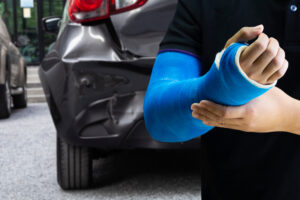If you drive a car, you’ve probably seen other drivers losing their temper when behind the wheel. And when you become the target of another driver’s road rage, this situation is intimidating.
Some cases of road rage on the roads don’t cause actual harm to anyone, but some lead to accidents that cause injuries and property damage.
If you suffer injuries and/or damage to your car because of someone else’s aggressive driving or reckless behavior, you can get compensated for your losses. A Abogado de accidentes automovilísticos Fredericksburg can help you navigate the legal procedures.
Programe una consulta gratuita
What is road rage?
Road rage is aggressive or violent behaviors stemming from the frustrations of driving or dealing with other drivers.
It’s not just feeling angry; it’s acts to intimidate or harm others. This can be aggressive driving, physical threats, verbal abuse, or actual assault.
Road rage is a lapse in self-control where a driver doesn’t think rationally, which can lead to dangerous confrontations.
Common causes of road rage
Road rage happens due to the following reasons:
Provocation by other drivers

Provocation is a common trigger of road rage. Actions like cutting off another car, tailgating, honking excessively, or making offensive gestures can cause a chain reaction of aggression.
A sense of anonymity
Anonymity can be a cloak for drivers who want to act aggressively without fear of judgment. Behind the wheel, people may feel detached from societal norms that typically govern their face-to-face interactions.
Congestion and traffic delays
Traffic congestion is notorious for causing frustration and rage on the road. The helplessness and lack of control of being stuck in traffic can lead to anger.
Impatience
The fast-paced nature of life means drivers are often in a hurry. This can manifest as road rage as individuals attempt to reach their destination by any means.
Verbal confrontations
An exchange of words can quickly escalate into full-blown aggression on the road. These confrontations can leave both parties feeling threatened and trigger a road rage incident.
Frustration and stress
Day-to-day personal or professional stressors can explode in various situations, including while driving. Drivers already on edge from unrelated stress are more likely to engage in road rage in response to driving events.
Conducir bajo la influencia
Substance abuse, such as driving under the influence of drugs or alcohol, impairs judgment and increases impulsivity in drivers. Statistically speaking, fatalities in crashes involving an alcohol-impaired driver account for 30 percent of all traffic-related deaths in the country.
Habit
For some people, aggressive driving may become a habit. These drivers use driving to vent their frustrations and display rage as a default reaction to any annoyance on the road. However, just because road rage becomes habitual does not make it safer or acceptable.
Each vehicle on the road is operated by another human being who experiences ups and downs in personal and professional life and faces its own stresses and challenges.
If you have suffered from road rage, you can rest assured that the law is on your side and provides recourse for recovery and justice.
Behaviors that could indicate road rage
Here are several behaviors that may indicate a person is experiencing road rage:
Verbal aggression and gestures
- Yelling or swearing: If you see a driver shouting or using insulting language, they may display clear signs of road rage.
- Offensive/obscene gestures: Hand signals that go way beyond a simple wave, mainly when used to express anger or frustration towards another road user, are red flags.
Following too closely and brake manipulation
- Chupar rueda: Someone driving too close may be trying to intimidate or hurry the other driver, an aggressive act often linked to road rage.
- Brake checking: A driver who suddenly hits their brakes when closely followed is likely engaging in a tit-for-tat response and can escalate the situation dangerously.
Threatening driving maneuvers
- Intentionally ramming vehicles: Using a vehicle to hit or bump another vehicle physically is one of the most extreme forms of road rage.
- Cutting off in traffic: Deliberately merging into a lane or in front of another car without sufficient space is aggressive and hazardous.
- Rapid accelerations: Quick bursts of speed, especially around other vehicles, can indicate anger or impulsive frustration.
Overuse of car horns and lights
- Aggressive horn honking: Excessive use of the car horn to show dissatisfaction instead of alerting others can indicate aggressive behavior.
- Flashing high beams: Persistently using high beams to glare at another driver or to retaliate is a potential sign of road rage.
Possible consequences of road rage
Here are several possible outcomes that can arise from road rage incidents:

- Accidents and injuries: One of road rage’s most immediate and dangerous consequences is the increased risk of traffic accidents. Enraged drivers often do not think clearly and may make risky maneuvers on the road. As a result, they endanger themselves, their passengers, and others on the road.
- Fatalidades: In the worst-case scenario, road rage can lead to fatal traffic incidents. When anger takes over, a driver may become aggressive or violent, potentially leading to high-speed collisions or intentional harm to others, which can result in loss of life.
- Daño a la propiedad: Road rage often results in aggressive driving behaviors such as tailgating, swerving, or braking suddenly. These actions lead to collisions that result in preventable property damage, not only to the vehicles involved but also potentially to public property or roadside structures.
- Emotional and psychological damage: Even if physical harm is avoided, road rage may still cause considerable emotional and psychological distress to those involved. Victims of aggressive driving behavior may experience trauma, develop a fear of driving, or suffer from anxiety and stress-related disorders as a result of a road rage incident.
- Consecuencias legales: Road rage can carry severe legal repercussions. Depending on the severity and outcome of the incident, someone can face charges such as reckless driving, assault, or even vehicular manslaughter. These legal issues lead to fines, license suspension, criminal records, or even jail time.
If you suffered an injury in an accident and believe the other driver’s road rage played a role in the crash, you need a lawyer’s help in pursuing compensation for your injuries and/or property damage.
What legal remedies are available if you’re a victim of a road rage incident?
Legal options are available if you’re injured or incurred any damage from a road rage incident.
Local laws determine the exact remedies for a road rage incident. Victims can get compensation through insurance claims or civil lawsuits for personal injury or property damage caused. In some cases, criminal charges may also be filed against perpetrators.
- Civil action: A civil action is typically taken to recover monetary compensation for medical bills, vehicle damage repair costs, and even psychological therapy required due to the incident. When pursuing legal action, documented evidence such as photographs of damage, medical reports, and witness testimonies becomes crucial.
- Criminal action: On the criminal side, charges can range from misdemeanor offenses like disorderly conduct to serious felonies such as assault with a deadly weapon if a car is used to threaten or cause harm. Law enforcement takes such acts seriously, and the consequences can include heavy fines, license revocation, and even imprisonment.
If you have become a victim of a road rage incident, you should contact a lawyer to determine the appropriate legal action. Every case is unique, so the best action to maximize compensation may vary depending on the incident’s circumstances.
How do you prove that the other driver engaged in road rage?
While you may be entitled to financial compensation, you still need to prove that the driver engaged in road rage or was otherwise negligent or careless in the operation of the motor vehicle.
Some of the types of evidence that may be effective in proving that you were involved in a road rage incident include:
Informe policial
A police report is an official document that outlines the details of the road rage incident. If the police were called to the scene, they would have made records that may include statements from those involved and any citations issued.
The report might mention aggressive driving behaviors such as speeding, weaving through traffic, or illegal overtaking, all of which can be indicative of road rage.
Witnesses
Bystanders, pedestrians, or drivers who witnessed the incident can provide independent accounts of the road rage episode. Their testimonies can be particularly compelling if they corroborate each other and match the victim’s version of the events.
Video footage
Many vehicles have dashcams, which can capture real-time evidence of road rage. Surveillance cameras at nearby businesses or traffic cameras can also provide third-party video evidence when available.
Such footage can provide irrefutable evidence as it shows the aggressive behavior, license plates, and the sequence of events as they unfolded.
The driver’s prior road rage incidents
If the aggressive driver has a history of road rage incidents, this pattern of behavior can serve as supplementary evidence.
Prior incidents documented by police reports or past complaints can reinforce the assertion that the driver has a propensity for such conduct.
Skid marks
Sometimes, skid marks on the road can demonstrate erratic or sudden maneuvers likely caused by aggressive driving. Accident reconstruction experts can often analyze skid marks to determine speeds and patterns of movement before a collision.
The extent of vehicle damage
The damage sustained by vehicles involved in a road rage incident may reveal a lot about the nature of the crash.
For example, damage inflicted on the side of a car might indicate that one vehicle deliberately sideswiped the other at a high rate of speed. Experts can often interpret damage patterns to support claims of intentional hostile aggression rather than a mere accident.
Collecting and presenting evidence after a road rage incident
When you suspect road rage is a factor in an accident, you should:
- Call the police to report the incident immediately.
- Gather names and contact information from witnesses.
- Seek out any available video footage from your dashcam or other sources.
- Take scene photos, including vehicle positions, skid marks, and damage.
- Contact a lawyer who focuses on traffic incidents or personal injury.
Combining this evidence can build a strong case to prove that road rage occurred. For help with your road rage case, call (866)-388-1307 to schedule your free consultation with a Abogado de lesiones personales Fredericksburg hoy.



